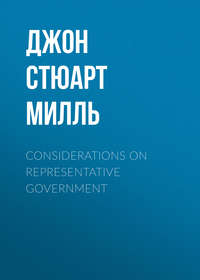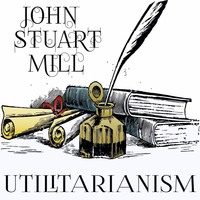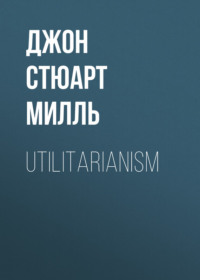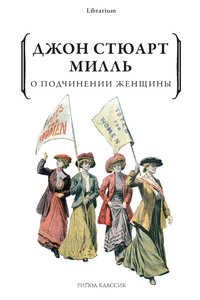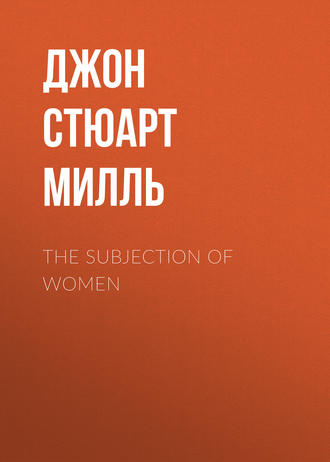 полная версия
полная версияThe Subjection of Women
The equality of married persons before the law, is not only the sole mode in which that particular relation can be made consistent with justice to both sides, and conducive to the happiness of both, but it is the only means of rendering the daily life of mankind, in any high sense, a school of moral cultivation. Though the truth may not be felt or generally acknowledged for generations to come, the only school of genuine moral sentiment is society between equals. The moral education of mankind has hitherto emanated chiefly from the law of force, and is adapted almost solely to the relations which force creates. In the less advanced states of society, people hardly recognise any relation with their equals. To be an equal is to be an enemy. Society, from its highest place to its lowest, is one long chain, or rather ladder, where every individual is either above or below his nearest neighbour, and wherever he does not command he must obey. Existing moralities, accordingly, are mainly fitted to a relation of command and obedience. Yet command and obedience are but unfortunate necessities of human life: society in equality is its normal state. Already in modern life, and more and more as it progressively improves, command and obedience become exceptional facts in life, equal association its general rule. The morality of the first ages rested on the obligation to submit to power; that of the ages next following, on the right of the weak to the forbearance and protection of the strong. How much longer is one form of society and life to content itself with the morality made for another? We have had the morality of submission, and the morality of chivalry and generosity; the time is now come for the morality of justice. Whenever, in former ages, any approach has been made to society in equality, Justice has asserted its claims as the foundation of virtue. It was thus in the free republics of antiquity. But even in the best of these, the equals were limited to the free male citizens; slaves, women, and the unenfranchised residents were under the law of force. The joint influence of Roman civilization and of Christianity obliterated these distinctions, and in theory (if only partially in practice) declared the claims of the human being, as such, to be paramount to those of sex, class, or social position. The barriers which had begun to be levelled were raised again by the northern conquests; and the whole of modern history consists of the slow process by which they have since been wearing away. We are entering into an order of things in which justice will again be the primary virtue; grounded as before on equal, but now also on sympathetic association; having its root no longer in the instinct of equals for self-protection, but in a cultivated sympathy between them; and no one being now left out, but an equal measure being extended to all. It is no novelty that mankind do not distinctly foresee their own changes, and that their sentiments are adapted to past, not to coming ages. To see the futurity of the species has always been the privilege of the intellectual élite, or of those who have learnt from them; to have the feelings of that futurity has been the distinction, and usually the martyrdom, of a still rarer élite. Institutions, books, education, society, all go on training human beings for the old, long after the new has come; much more when it is only coming. But the true virtue of human beings is fitness to live together as equals; claiming nothing for themselves but what they as freely concede to every one else; regarding command of any kind as an exceptional necessity, and in all cases a temporary one; and preferring, whenever possible, the society of those with whom leading and following can be alternate and reciprocal. To these virtues, nothing in life as at present constituted gives cultivation by exercise. The family is a school of despotism, in which the virtues of despotism, but also its vices, are largely nourished. Citizenship, in free countries, is partly a school of society in equality; but citizenship fills only a small place in modern life, and does not come near the daily habits or inmost sentiments. The family, justly constituted, would be the real school of the virtues of freedom. It is sure to be a sufficient one of everything else. It will always be a school of obedience for the children, of command for the parents. What is needed is, that it should be a school of sympathy in equality, of living together in love, without power on one side or obedience on the other. This it ought to be between the parents. It would then be an exercise of those virtues which each requires to fit them for all other association, and a model to the children of the feelings and conduct which their temporary training by means of obedience is designed to render habitual, and therefore natural, to them. The moral training of mankind will never be adapted to the conditions of the life for which all other human progress is a preparation, until they practise in the family the same moral rule which is adapted to the normal constitution of human society. Any sentiment of freedom which can exist in a man whose nearest and dearest intimacies are with those of whom he is absolute master, is not the genuine or Christian love of freedom, but, what the love of freedom generally was in the ancients and in the middle ages – an intense feeling of the dignity and importance of his own personality; making him disdain a yoke for himself, of which he has no abhorrence whatever in the abstract, but which he is abundantly ready to impose on others for his own interest or glorification.
I readily admit (and it is the very foundation of my hopes) that numbers of married people even under the present law, (in the higher classes of England probably a great majority,) live in the spirit of a just law of equality. Laws never would be improved, if there were not numerous persons whose moral sentiments are better than the existing laws. Such persons ought to support the principles here advocated; of which the only object is to make all other married couples similar to what these are now. But persons even of considerable moral worth, unless they are also thinkers, are very ready to believe that laws or practices, the evils of which they have not personally experienced, do not produce any evils, but (if seeming to be generally approved of) probably do good, and that it is wrong to object to them. It would, however, be a great mistake in such married people to suppose, because the legal conditions of the tie which unites them do not occur to their thoughts once in a twelvemonth, and because they live and feel in all respects as if they were legally equals, that the same is the case with all other married couples, wherever the husband is not a notorious ruffian. To suppose this, would be to show equal ignorance of human nature and of fact. The less fit a man is for the possession of power – the less likely to be allowed to exercise it over any person with that person's voluntary consent – the more does he hug himself in the consciousness of the power the law gives him, exact its legal rights to the utmost point which custom (the custom of men like himself) will tolerate, and take pleasure in using the power, merely to enliven the agreeable sense of possessing it. What is more; in the most naturally brutal and morally uneducated part of the lower classes, the legal slavery of the woman, and something in the merely physical subjection to their will as an instrument, causes them to feel a sort of disrespect and contempt towards their own wife which they do not feel towards any other woman, or any other human being, with whom they come in contact; and which makes her seem to them an appropriate subject for any kind of indignity. Let an acute observer of the signs of feeling, who has the requisite opportunities, judge for himself whether this is not the case: and if he finds that it is, let him not wonder at any amount of disgust and indignation that can be felt against institutions which lead naturally to this depraved state of the human mind.
We shall be told, perhaps, that religion imposes the duty of obedience; as every established fact which is too bad to admit of any other defence, is always presented to us as an injunction of religion. The Church, it is very true, enjoins it in her formularies, but it would be difficult to derive any such injunction from Christianity. We are told that St. Paul said, “Wives, obey your husbands:” but he also said, “Slaves, obey your masters.” It was not St. Paul's business, nor was it consistent with his object, the propagation of Christianity, to incite any one to rebellion against existing laws. The apostle's acceptance of all social institutions as he found them, is no more to be construed as a disapproval of attempts to improve them at the proper time, than his declaration, “The powers that be are ordained of God,” gives his sanction to military despotism, and to that alone, as the Christian form of political government, or commands passive obedience to it. To pretend that Christianity was intended to stereotype existing forms of government and society, and protect them against change, is to reduce it to the level of Islamism or of Brahminism. It is precisely because Christianity has not done this, that it has been the religion of the progressive portion of mankind, and Islamism, Brahminism, &c., have been those of the stationary portions; or rather (for there is no such thing as a really stationary society) of the declining portions. There have been abundance of people, in all ages of Christianity, who tried to make it something of the same kind; to convert us into a sort of Christian Mussulmans, with the Bible for a Koran, prohibiting all improvement: and great has been their power, and many have had to sacrifice their lives in resisting them. But they have been resisted, and the resistance has made us what we are, and will yet make us what we are to be.
After what has been said respecting the obligation of obedience, it is almost superfluous to say anything concerning the more special point included in the general one – a woman's right to her own property; for I need not hope that this treatise can make any impression upon those who need anything to convince them that a woman's inheritance or gains ought to be as much her own after marriage as before. The rule is simple: whatever would be the husband's or wife's if they were not married, should be under their exclusive control during marriage; which need not interfere with the power to tie up property by settlement, in order to preserve it for children. Some people are sentimentally shocked at the idea of a separate interest in money matters, as inconsistent with the ideal fusion of two lives into one. For my own part, I am one of the strongest supporters of community of goods, when resulting from an entire unity of feeling in the owners, which makes all things common between them. But I have no relish for a community of goods resting on the doctrine, that what is mine is yours but what is yours is not mine; and I should prefer to decline entering into such a compact with any one, though I were myself the person to profit by it.
This particular injustice and oppression to women, which is, to common apprehensions, more obvious than all the rest, admits of remedy without interfering with any other mischiefs: and there can be little doubt that it will be one of the earliest remedied. Already, in many of the new and several of the old States of the American Confederation, provisions have been inserted even in the written Constitutions, securing to women equality of rights in this respect: and thereby improving materially the position, in the marriage relation, of those women at least who have property, by leaving them one instrument of power which they have not signed away; and preventing also the scandalous abuse of the marriage institution, which is perpetrated when a man entraps a girl into marrying him without a settlement, for the sole purpose of getting possession of her money. When the support of the family depends, not on property, but on earnings, the common arrangement, by which the man earns the income and the wife superintends the domestic expenditure, seems to me in general the most suitable division of labour between the two persons. If, in addition to the physical suffering of bearing children, and the whole responsibility of their care and education in early years, the wife undertakes the careful and economical application of the husband's earnings to the general comfort of the family; she takes not only her fair share, but usually the larger share, of the bodily and mental exertion required by their joint existence. If she undertakes any additional portion, it seldom relieves her from this, but only prevents her from performing it properly. The care which she is herself disabled from taking of the children and the household, nobody else takes; those of the children who do not die, grow up as they best can, and the management of the household is likely to be so bad, as even in point of economy to be a great drawback from the value of the wife's earnings. In an otherwise just state of things, it is not, therefore, I think, a desirable custom, that the wife should contribute by her labour to the income of the family. In an unjust state of things, her doing so may be useful to her, by making her of more value in the eyes of the man who is legally her master; but, on the other hand, it enables him still farther to abuse his power, by forcing her to work, and leaving the support of the family to her exertions, while he spends most of his time in drinking and idleness. The power of earning is essential to the dignity of a woman, if she has not independent property. But if marriage were an equal contract, not implying the obligation of obedience; if the connexion were no longer enforced to the oppression of those to whom it is purely a mischief, but a separation, on just terms (I do not now speak of a divorce), could be obtained by any woman who was morally entitled to it; and if she would then find all honourable employments as freely open to her as to men; it would not be necessary for her protection, that during marriage she should make this particular use of her faculties. Like a man when he chooses a profession, so, when a woman marries, it may in general be understood that she makes choice of the management of a household, and the bringing up of a family, as the first call upon her exertions, during as many years of her life as may be required for the purpose; and that she renounces, not all other objects and occupations, but all which are not consistent with the requirements of this. The actual exercise, in a habitual or systematic manner, of outdoor occupations, or such as cannot be carried on at home, would by this principle be practically interdicted to the greater number of married women. But the utmost latitude ought to exist for the adaptation of general rules to individual suitabilities; and there ought to be nothing to prevent faculties exceptionally adapted to any other pursuit, from obeying their vocation notwithstanding marriage: due provision being made for supplying otherwise any falling-short which might become inevitable, in her full performance of the ordinary functions of mistress of a family. These things, if once opinion were rightly directed on the subject, might with perfect safety be left to be regulated by opinion, without any interference of law.
CHAPTER III
On the other point which is involved in the just equality of women, their admissibility to all the functions and occupations hitherto retained as the monopoly of the stronger sex, I should anticipate no difficulty in convincing any one who has gone with me on the subject of the equality of women in the family. I believe that their disabilities elsewhere are only clung to in order to maintain their subordination in domestic life; because the generality of the male sex cannot yet tolerate the idea of living with an equal. Were it not for that, I think that almost every one, in the existing state of opinion in politics and political economy, would admit the injustice of excluding half the human race from the greater number of lucrative occupations, and from almost all high social functions; ordaining from their birth either that they are not, and cannot by any possibility become, fit for employments which are legally open to the stupidest and basest of the other sex, or else that however fit they may be, those employments shall be interdicted to them, in order to be preserved for the exclusive benefit of males. In the last two centuries, when (which was seldom the case) any reason beyond the mere existence of the fact was thought to be required to justify the disabilities of women, people seldom assigned as a reason their inferior mental capacity; which, in times when there was a real trial of personal faculties (from which all women were not excluded) in the struggles of public life, no one really believed in. The reason given in those days was not women's unfitness, but the interest of society, by which was meant the interest of men: just as the raison d'état, meaning the convenience of the government, and the support of existing authority, was deemed a sufficient explanation and excuse for the most flagitious crimes. In the present day, power holds a smoother language, and whomsoever it oppresses, always pretends to do so for their own good: accordingly, when anything is forbidden to women, it is thought necessary to say, and desirable to believe, that they are incapable of doing it, and that they depart from their real path of success and happiness when they aspire to it. But to make this reason plausible (I do not say valid), those by whom it is urged must be prepared to carry it to a much greater length than any one ventures to do in the face of present experience. It is not sufficient to maintain that women on the average are less gifted than men on the average, with certain of the higher mental faculties, or that a smaller number of women than of men are fit for occupations and functions of the highest intellectual character. It is necessary to maintain that no women at all are fit for them, and that the most eminent women are inferior in mental faculties to the most mediocre of the men on whom those functions at present devolve. For if the performance of the function is decided either by competition, or by any mode of choice which secures regard to the public interest, there needs be no apprehension that any important employments will fall into the hands of women inferior to average men, or to the average of their male competitors. The only result would be that there would be fewer women than men in such employments; a result certain to happen in any ease, if only from the preference always likely to be felt by the majority of women for the one vocation in which there is nobody to compete with them. Now, the most determined depreciator of women will not venture to deny, that when we add the experience of recent times to that of ages past, women, and not a few merely, but many women, have proved themselves capable of everything, perhaps without a single exception, which is done by men, and of doing it successfully and creditably. The utmost that can be said is, that there are many things which none of them have succeeded in doing as well as they have been done by some men – many in which they have not reached the very highest rank. But there are extremely few, dependent only on mental faculties, in which they have not attained the rank next to the highest. Is not this enough, and much more than enough, to make it a tyranny to them, and a detriment to society, that they should not be allowed to compete with men for the exercise of these functions? Is it not a mere truism to say, that such functions are often filled by men far less fit for them than numbers of women, and who would be beaten by women in any fair field of competition? What difference does it make that there may be men somewhere, fully employed about other things, who may be still better qualified for the things in question than these women? Does not this take place in all competitions? Is there so great a superfluity of men fit for high duties, that society can afford to reject the service of any competent person? Are we so certain of always finding a man made to our hands for any duty or function of social importance which falls vacant, that we lose nothing by putting a ban upon one-half of mankind, and refusing beforehand to make their faculties available, however distinguished they may be? And even if we could do without them, would it be consistent with justice to refuse to them their fair share of honour and distinction, or to deny to them the equal moral right of all human beings to choose their occupation (short of injury to others) according to their own preferences, at their own risk? Nor is the injustice confined to them: it is shared by those who are in a position to benefit by their services. To ordain that any kind of persons shall not be physicians, or shall not be advocates, or shall not be members of parliament, is to injure not them only, but all who employ physicians or advocates, or elect members of parliament, and who are deprived of the stimulating effect of greater competition on the exertions of the competitors, as well as restricted to a narrower range of individual choice.
It will perhaps be sufficient if I confine myself, in the details of my argument, to functions of a public nature: since, if I am successful as to those, it probably will be readily granted that women should be admissible to all other occupations to which it is at all material whether they are admitted or not. And here let me begin by marking out one function, broadly distinguished from all others, their right to which is entirely independent of any question which can be raised concerning their faculties. I mean the suffrage, both parliamentary and municipal. The right to share in the choice of those who are to exercise a public trust, is altogether a distinct thing from that of competing for the trust itself. If no one could vote for a member of parliament who was not fit to be a candidate, the government would be a narrow oligarchy indeed. To have a voice in choosing those by whom one is to be governed, is a means of self-protection due to every one, though he were to remain for ever excluded from the function of governing: and that women are considered fit to have such a choice, may be presumed from the fact, that the law already gives it to women in the most important of all cases to themselves: for the choice of the man who is to govern a woman to the end of life, is always supposed to be voluntarily made by herself. In the case of election to public trusts, it is the business of constitutional law to surround the right of suffrage with all needful securities and limitations; but whatever securities are sufficient in the case of the male sex, no others need be required in the case of women. Under whatever conditions, and within whatever limits, men are admitted to the suffrage, there is not a shadow of justification for not admitting women under the same. The majority of the women of any class are not likely to differ in political opinion from the majority of the men of the same class, unless the question be one in which the interests of women, as such, are in some way involved; and if they are so, women require the suffrage, as their guarantee of just and equal consideration. This ought to be obvious even to those who coincide in no other of the doctrines for which I contend. Even if every woman were a wife, and if every wife ought to be a slave, all the more would these slaves stand in need of legal protection: and we know what legal protection the slaves have, where the laws are made by their masters.
With regard to the fitness of women, not only to participate in elections, but themselves to hold offices or practise professions involving important public responsibilities; I have already observed that this consideration is not essential to the practical question in dispute: since any woman, who succeeds in an open profession, proves by that very fact that she is qualified for it. And in the case of public offices, if the political system of the country is such as to exclude unfit men, it will equally exclude unfit women: while if it is not, there is no additional evil in the fact that the unfit persons whom it admits may be either women or men. As long therefore as it is acknowledged that even a few women may be fit for these duties, the laws which shut the door on those exceptions cannot be justified by any opinion which can be held respecting the capacities of women in general. But, though this last consideration is not essential, it is far from being irrelevant. An unprejudiced view of it gives additional strength to the arguments against the disabilities of women, and reinforces them by high considerations of practical utility.



